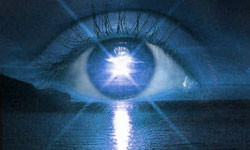Here’s another way of thinking about what I wrote about in my last entry, as far as how you think about what you’re looking at, and how your attention behaves in moving around.
There are two ways to think about how blurry the image is.
A – Be frustrated with how blurry it is, and hope that in a quick moment you’ll be able to do something to clear it up. Every time you look for or towards another detail, you’re hoping it will be clearer. You’re waiting for all this nonsense to be done with so you can finally see it, because you don’t see it unless you see it clearly. It’s a waste of time looking at or studying anything or trying to discern any meaning from what you’re seeing unless it’s clearer. You “hold out” on perceiving until someday when you’ll be able to see clearly. You treat your eyes as something you have to trick or push into focusing correctly. You disavow any personal responsibility, in this moment, for the situation, blaming it on your eyes or brain for being messed up due to only your past mistakes or experiences.
or B – With each detail or piece of blur you look at, you pay attention to what you do perceive, even if it’s confusing and unfocused. You’re thankful for each thing you look at, and every time you shift your attention even a little bit, to a nearby point, what you’re looking at is a little different, even if it’s just because you’re paying attention to a different part of it more, and with every slightly change you’re thankful for the whole new data set you get to perceive. Every shift, every blink, means a whole new picture. You want to look at more and more things, and look at more and more parts of those things, because you know the more you perceive, the better you see, and then the more still you perceive, and so on in a continual feedback process of your vision improving. You treat vision as an active and busy process of perceiving.
So which way makes the most sense? This is what the idea of “accepting the blur”, a concept that some vision improvement teachers have shared, is all about. Are you going to fight against what you perceive, or are you going to take what you can get and fully immerse yourself in using it to accomplish your goal? Your vision represents the way you perceive, or the way you treat the information that you get.
get help on our Facebook Group!

I founded iblindness.org in 2002 as I began reading books on the Bates Method and became interested in vision improvement. I believe that everyone who is motivated can identify the roots of their vision problems and apply behavioral changes to solve them.

Very interesting, thank you for sharing this useful information as always!
Lord